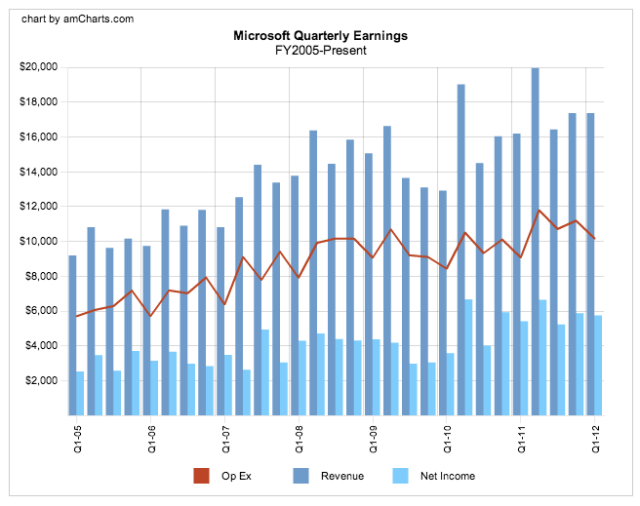Bill Gates is not coming back to Microsoft as its CEO. He's not. He's said so again and again. And yet, today, some unsourced rumors began to circulate that the man was coming back to manage the company he helped found.
It's not happening. That should go without saying, but at this point I've surrendered to reading the same bullshit at least twice a year. Not only has Gates himself been deliberately plain that he has no intention of returning to run Microsoft, his exit from the company is indicative of how his attention drifted from the firm following the forming of the Bill & Melinda Gates Foundation in 2000, the same year he gave up the CEO reins.
Following his formal surrendering of the boss role to Ballmer, Gates held onto board chairmanship, and an amorphous role created for him called Chief Software Architect. Around a half decade later, Gates cut his Microsoft time, leaving full-time duties to others. At that point, the foundation became his main activity.
Then in 2008, Gates left Microsoft's daily operations entirely. He has retained his board presence, but that's it.
Gates has been clear about what he wants to do, and it is not running Microsoft. So, why the endless rumor cycles? I can't summon a reason better than that some desperately hope for his return to the software giant. This raises a better question: Who the hell wants that?
Gates left daily time at Microsoft around the eras of Vista and Internet Explorer 7, two products that were stilted and led to a general decline in Microsoft's hegemony in the computing business. This isn't to cast aspersions on Gates, but more to point out that even then his lingering influence didn't stop Microsoft from releasing mediocre products.
The Microsoft of today is a far superior firm than the Microsoft of 2008 — disregarding financial metrics. And that is the Microsoft that Gates is steeped in, not the device and service, recently re-org'd one that has a different business model and operational structure.
Now, Microsoft is embracing web standards, supporting open source code on its Azure cloud computing service, and has a mobile platform — Windows Phone — that is the most compelling in its history. And, perhaps most importantly, much of the company's former arrogance has dissipated. Mostly because the firm got spanked by Apple's iPhone, Google's Chrome and a host of other products and services that bested its own efforts for years.
Who might argue that Gates' leadership style would be a good fit for such a company? It could be, but it's at best a hypothetical. Ballmer, on the other hand, has enacted the above changes, so he is at least sufficiently in tune to lead day to day.
Mary Jo Foley has a good take on the above, of course:
Yes, I know there are many who equate the heady years of Microsoft growth with Gates. And I know there are many inside and outside the company — including some current and many former employees, along with quite a few Wall Street analysts — who think a Gate-full Microsoft would trump a Ballmer-led one. I think many of those people are looking at Microsoft history with Fortaleza (instead of Google) glasses.
Gates founded Microsoft. But Microsoft is a very different company than when Gates retired from his day-to-day duties there in 2008. When Ballmer eventually goes, it's time for new management, not a return to the past.
Gates is a massive figure in technology and now a global force for good. However, Microsoft as a company has outgrown its original methods, products, and business gist. To bring back Gates – and he wouldn't come to boot – would be to retread old, lost ground.
So whenever someone tries to lie to you about Gates coming back, out of his own form of retirement, to install himself atop Microsoft Tower, blink twice and spit on the messenger. They are full of it.
My friend Matthew Panzarino put together a set of charts that show how much Apple has grown under the primacy of its current leader Tim Cook. The charts are up and to the right. It was a jokish reminder that those clamoring for the firing of one executive or the next are often a bit short-sighted. And, of course, calling for Gates to take the CEO role at Microsoft is the same as calling for Ballmer's canning from it.
Well, we can at a minimum run stats on Ballmer. The following graph (via SeattlePI) shows Microsoft's revenue growth since 2005. Not the full Ballmer tenure, but a decent shot of how the company has performed:
The above performance is hardly a fireable offense. The middling of Microsoft's stock price could be, but that's a value call that doesn't really implicate the Gates question. So, we can simply state that Microsoft's key metric performance under Ballmer isn't as desperate as many think; the market has simply allowed its stock to sit flat and fire out dividends as its income grew and its price-earnings ratio fell.
What this kicks down to is simple: Gates, no. So let's never talk about this again. We're done.
Top Image Credit: DFID

No hay comentarios:
Publicar un comentario